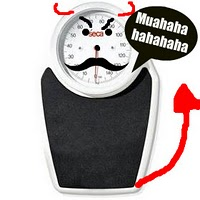The science behind Johnny’s burger binge!
As some of you guys have probably seen, I enjoy the finer foods of life, pizza, Mexican, ice cream, and of course, burgers. So how can I claim to be fitness professional, still eat this stuff, and brag about it? Well hears the deal! You are being lied to. You are being fooled by old 1950’s science which suggest you need to eat ‘clean’ by eating 12 small meals of chicken and broccoli a day. Will this method work? Absolutely! But it’s not because you are eating magic food, it is because your daily caloric intake is less than the amount of calories you need to maintain your current weight.
So what is a calorie? A calorie is the approximate amount of energy needed to raise the temperature of one kilogram of water by one degree Celsius. So when you hear people talking about ‘good’ calories and ‘bad’ calories you know they have no idea what they are talking about. A calorie is a unit of measurement, so talking in terms of ‘good’ calories and ‘bad’ calories is as silly as saying ‘good’ kilometres and ‘bad’ kilometres, or ‘good’ centimetres and ‘bad’ centimetres. Units of measurements are not good or evil!
So what’s my point? If you eat less than your maintenance caloric intake over 1 or 10 meals, you will lose weight!
So we know calories are important, but so are the building blocks of those calories. Carbohydrates, fats, proteins (and fibre), also known as macronutrients play crucial roles in bodily functions, such as repairing tissue, aiding brain function, and protecting cells. So it is just as important to hit these targets as well.
Now I’m not saying that you have a green light to go out and eat crap for every meal, but understand that portion control is what we really need to be looking at. If you want to eat something high in calories, then understand it will cost you either on the scales, waste line, or in the gym.
Here is where it gets tricky. Although all calories are created equal, a calorie eaten is not exactly a calorie eaten. Let me explain. Lets use a banana as an example (roughly 130 calories). When you eat a banana, because of the fibre in the banana the banana is not going to be absorbed immediately, so your blood sugar levels will rise more gradually and give your body the time to process it. If you were to consume 130 calories of chocolate, or soft drink (no fibre), the liver gets a massive rush of sugar, because it cannot process that sugar fast enough, it will have no choice but to store that as fat to be used later.
So pick your foods wisely, but don’t make yourself miserable, or feel guilty for eating something nice, just understand the science and cost to the body. In my opinion the most important things in regards to diet is portion control and common sense.
* I am an extremely active person; in fact according to my last metabolism test my maintenance caloric intake is around 3500 calories. My diet is not suitable for everyone and you should consult an expert to tailor a plan for you.
**I tried to keep this short as I could of written pages on this subject. If you would like anymore info get googling or feel free to ask me

